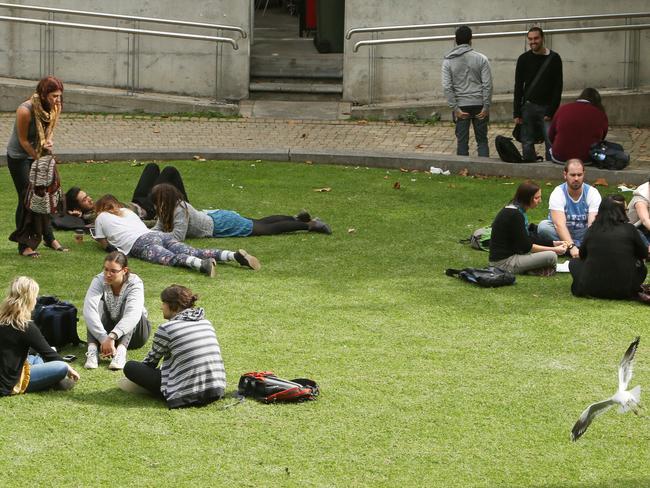Is it time to turn your back on university?
EMPLOYERS don’t care about it, students are losing interest, and the graduate pay’s not great anyway.
ACCESS to higher education used to be considered one of the things that made Australia great, but as demand drops and degrees become less valued, it seems that era is well and truly over.
University enrolment numbers have flatlined, graduate employment last year hit an all time low and employers are going cold on degrees.
Combine this with climbing first year drop out rates and uncertainty over university fee reforms thanks to a stalling government, it seems like there’s never been a better time to turn your back on university.
The Australian Department of Education and Training’s selected higher education statistics, released earlier this week, showed the overall number of new university increased by only 0.1 per cent.
Universities Australia Chief Executive Belinda Robinson said the results had been “anticipated”, indicating growth had plateaued, evened out following a surge of “unmet demand”.
In interviews, Ms Robinson suggested the Rudd-Gillard government’s university funding scheme had pushed demand for universities beyond their capacities, and that the current government’s campaign around $100,000 degrees may have helped to reduce demand.

It’s not just students that are backing away from university degrees. Earlier this month, international publishing house Penguin Random House joined the ranks of major consulting firms Ernst and Young and PricewaterhouseCoopers, dropping degrees as a requirement for job applicants.
In Australia, some smaller employers are shifting away from hiring graduates or university students altogether, believing kids are coming out of university with “no real skills” or simply being taught the wrong things.
In an earlier interview with news.com.au Australia Chamber of Commerce and Industry chief executive officer Kate Carnell said employers found 20-somethings were more qualified than ever before. Graduates were showing up to work with degrees from universities that were “disconnected with the workforce”, she said.
“A number of our members consistently tell us they’re seeing students come out of university or training programs and they might have the academic or theoretical skills, but no skills to work at all. It makes them really hard to employ,” she said.
And just as employers are being turned off graduates, students are seeing very little incentives to complete their studies with university graduate salaries going down.

The shift in demand for university education is sending a message to institutions and heralding change for career-seekers and employers.
In an interview with ABC radio, deputy vice chancellor of Deakin University and fellow of the Australian Learning and Teaching Council, Beverley Oliver, said tertiary education providers were getting the message, and adjusting their courses to meet new expectations from students and the changing workforce.
“I think the sector has made great changes over the last 15 years, particularly making sure the degree is a signifier of more than just marks and grades,” she said.
“I don’t think it’s an indictment, I think it’s a signal and we should use it to improve what we do. We can always improve what we do and of course employers can as well.”
Advocates of alternative educational pathways like apprenticeships and workplace learning are cheering at the apparent shift away from reliance on universities.
For those who are continuing to pursue a university education, the federal education minister has a word of advice.
“Australians must think carefully about the courses they enrol in to ensure they are entering a course that they are not only passionate about but that has a job at the end,” senator Simon Birmingham said.
While encouraging new figures show those who found work four months out of university had grown slightly on last year’s, about one-third of graduates did not immediately find a job.



